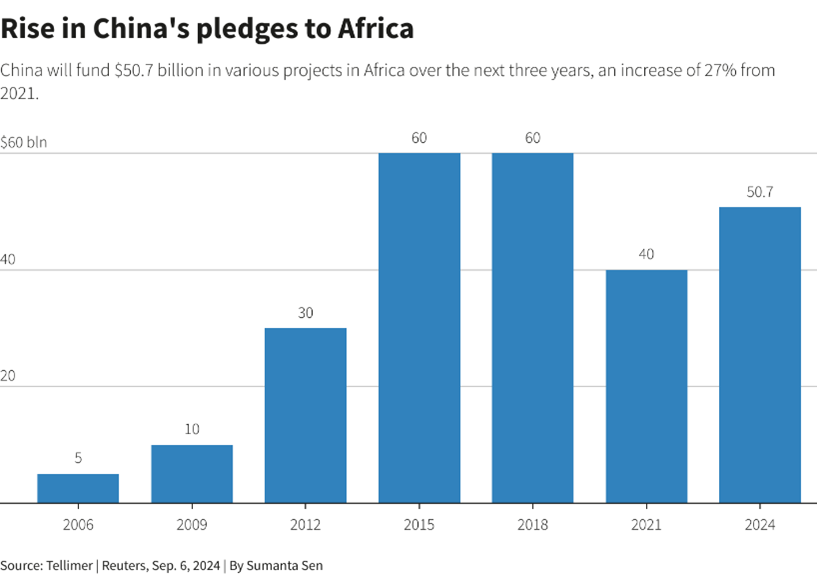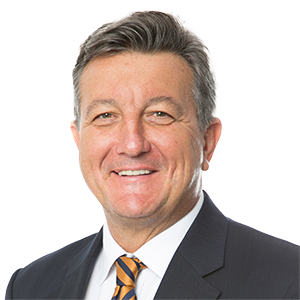Introduction
Earlier this month, President Ramaphosa attended a state visit to China with President Xi Jinping before the 9th Forum on China-Africa Cooperation (FOCAC) in Beijing. Around 40 African nations were represented, and South Africa's President Cyril Ramaphosa attended the Summit with members of the new Government of National Unity, including Agriculture Minister and Leader of the Opposition John Steenhuisen.
Other GNU delegates in attendance were ministers of international relations and cooperation, science, technology, innovation, human settlements, small business development, trade, industry and competition, electricity and energy, public works and infrastructure, and higher education.
Held every three years, the FOCAC was established in 2000 to promote relations and collaboration between China and Africa's 54 states. This year, Jinping emphasised elevating China's ties with South Africa to a strategic partnership.
As the world's second-largest economy, China is seeking to tap Africa's vast natural resources, including copper, gold, lithium, and rare earth minerals. Africa’s vast control over vital commodities such as cobalt, lithium, and rare earth minerals gives the continent unprecedented leverage.
South Africa also supplies large quantities of citrus and beef to China and is looking to expand the basket of goods it sells and leverage its China trade relationship in a strategic way to benefit South Africa.
China has provided African countries with billions in loans that have helped build infrastructure. However, China has been criticised for leaving projects unfinished and African governments saddled with huge debts. A call for transparency and stringent completion timelines would transform these projects from incomplete ventures into pillars of sustainable development. Critics have questioned whether China's investments and loans to Africa constitute a re-colonisation of the continent or a true partnership, as China claims to be after.
At FOCAC, China pledged $51bn over three years to fund new energy sector and infrastructure projects. However, African nations reported that they wanted to hear of China's plans to fulfil an unfulfilled pledge from the previous Summit in 2021 to buy $300 billion of goods and seek assurances on the progress of incomplete Chinese-funded infrastructure projects, such as a railway designed to link the greater East African region.
Diminishing trade with the US and Europe?
Last year, China overtook the European Union (EU) as South Africa's largest trading partner. Given the studies and data relating to the EU's Carbon Border Adjustment Mechanism (CBAM), which is currently in a transition phase with implementation set to be in 2026, it's likely that South African exports to the EU will fall even further in the years to come.
A working paper commissioned by the Presidential Climate Commission to unpack the implications of the EU's Carbon Border Adjustment Mechanism (CBAM) on South Africa has shown an overall negative impact on the country's exports. This impact is because the country relies on coal-powered electricity in production and other industrial activities.
Furthermore, a country-specific study published in 2022 showed that the CBAM (based on a carbon price of $75 per ton applied to direct emissions) would see South African exports to the EU fall by 4 per cent and GDP reduced by 0.02 per cent. CBAM's implementation could potentially push the country further into the arms of our BRIC partners. However, it's up to African nations to ensure that the terms and fine print of our partnerships with China benefit African citizens.
The US, EU, and Asian nations have invested heavily in manufacturing plants set up in the last two decades to support SA's localisation strategy. These include BMW, Ford, Hyundai, Isuzu, Mahindra, Mercedes-Benz, Nissan, Toyota, and VW. Their manufacturing locations employ thousands and produce a wide range of vehicle models for both the domestic market and for export to foreign markets.
At FOCAC, President Ramaphosa said SA would seek to attract China's electric vehicle manufacturers, including its largest, BYD, which has apparently shown interest in setting up manufacturing plants in South Africa.
Geopolitical changes mean SA & Africa need a new, cohesive trade strategy
Geopolitical shifts have seen the intensification of rivalry among global powers for influence in Africa, including China, its allies Russia and certain sectors of the Middle East and the more closely aligned US and European nations. Now, more than ever, African nations must use these competing interests to their advantage
China's economic slowdown has pressured it to find political allies to buy its goods. Analysts say that its generosity towards Africa can be explained by the economic trouble at home, as growth has slowed to levels not seen in decades. There are also concerns over a growing tussle with the United States. SA's ideological closeness to China and support for Russia in its war against Ukraine have raised the ire of US legislators, who have campaigned for US senators to review trade relations with SA.
The US and European governments followed that with an intensive campaign to rally African governments to oppose Moscow's war in Ukraine. SA has chosen to remain nonaligned. For now, tensions between SA and the US have subsided, with representatives managing the tensions and speaking of the mutually beneficial relationship.
With Israel, the US embassy most recently adopted a neutral position on SA's case against Israel at the International Court of Justice (ICJ). However, there's no guarantee that future US governments will be as preferential to SA's nonaligned stance on Ukraine and its vehement opposition to Israel.
Africa needs a united and coherent vision for China
African nations need to decide what they want from their partnerships with China. Failure to act decisively could mean that Africa’s partnerships with global powers will remain unequal. And African governments could ask their citizens what they want in terms of Chinese imports. Experts agree that in the 24 years of FOCAC, African countries still have no coherent strategy towards China, yet China has published several comprehensive strategies towards Africa.
Ideologically, many African nations align with the communist party ideals of the Chinese government. In addition, the Chinese have moved some 800 million people out of poverty in 40 years. That's an incredible achievement, and with the right terms and conditions, China's trade relations with Africa can be more of a partnership and less of a bank-roller
relationship.






